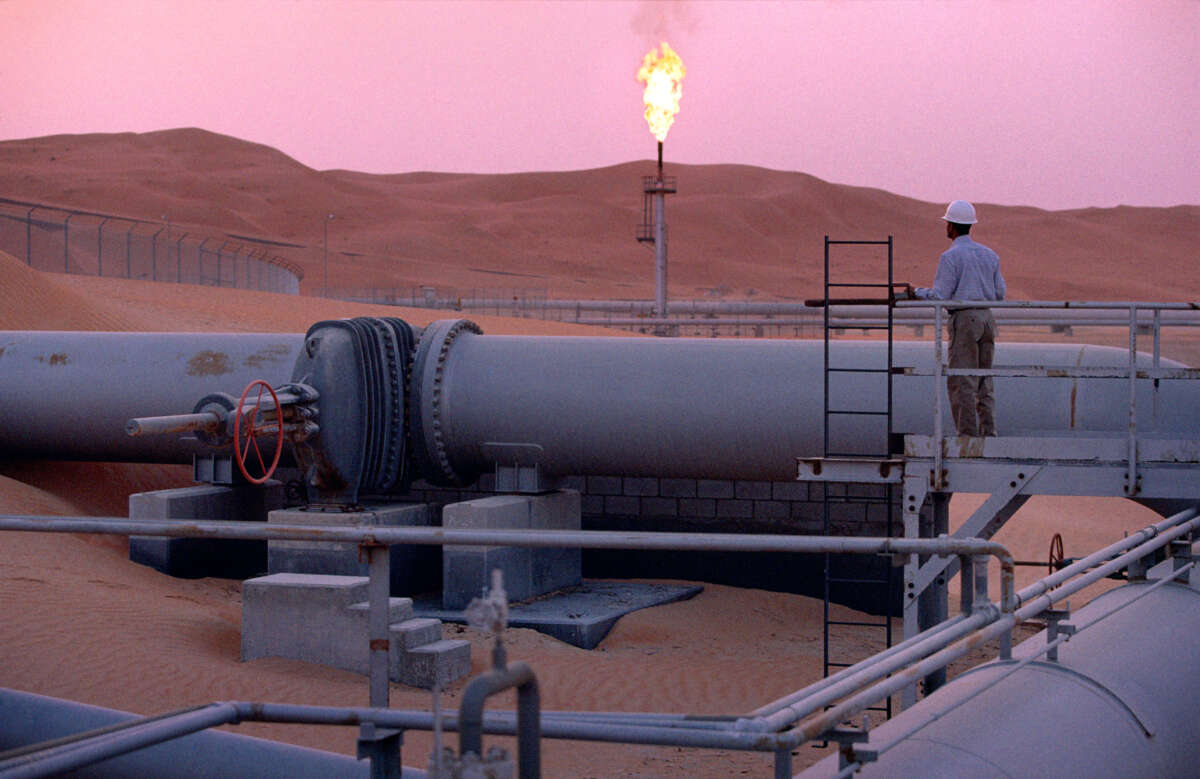Did you know that Truthout is a nonprofit and independently funded by readers like you? If you value what we do, please support our work with a donation.
Top Saudi Arabian officials, led by Saudi Crown Prince and Prime Minister Mohammed bin Salman, have formulated a covert plan to make countries across Africa and Asia dependent on fossil fuel products, a new bombshell investigation has revealed.
According to the investigation by Centre for Climate Reporting (CCR) and Channel 4 News, which went undercover to shine a light on the plan, the goal of the Oil Sustainability Program (OSP) is to ensure that Saudi Arabia’s oil revenues are protected as other countries, particularly wealthy countries, transition to renewable energy sources.
This reportedly includes deploying fleets of gas-fueled vehicles for ride-hailing services and bus companies across Africa and Asia; working with an auto manufacturer to develop a cheap car that can be sold in these countries; encouraging the use of greenhouse gas-emitting heavy fuel oils for power as a supposed path for “sustainable development”; and lobbying against electric vehicle subsidies across world governments. It also involves a plan to fast-track the development of supersonic jet travel for commercial settings because it consumes more jet fuel than typical commercial flights.
Such projects, of which there are dozens, are quite extensive, the investigation found. The plan to discourage the growth of electric vehicles, for instance, involves not just assessing countries’ infrastructure and economics related to electric cars, but also psychological studies to understand how best to boost oil-fueled vehicles instead.
Experts say that the plan is essentially to create a dependence on fossil fuels in African and Asian countries — despite many of these regions being among the worst affected by the climate crisis – even as other world leaders are saying that there must be greater investment in renewable energies for poorer countries to help them “leapfrog” economic growth spurred by fossil fuel use.
“The Saudi government is like a drug dealer trying to get Africa hooked on its harmful product,” Mohamed Adow, director of climate organization Power Shift Africa, told CCR. “The rest of the world is cleaning up its act and weaning itself off dirty and polluting fossil fuels and Saudi Arabia is getting desperate for more customers and is turning its sights on Africa.”
“It’s like the tobacco companies that knew the addictive and lethal nature of cigarettes yet continued to get millions of teenagers hooked on them,” Adow continued. “It’s repulsive.”
OSP is a wide-ranging project, reporters found, with the most powerful Saudi government entities involved, including Saudi Aramco, the country’s state-owned oil and gas company and the largest oil company in the world. Project leader Mohammed Al Tayyar has traveled to at least one African country, South Africa, to pitch the project and seek collaborators.
Though Saudi Arabian leaders claim to support the goals of the Paris climate agreement in public, the investigation finds that they have privately been working on the OSP to increase demand for oil and gas — despite the fact that climate experts across the world say that oil and gas use must be drawn down in order to avoid the worst impacts of the climate crisis.
In private calls, Saudi leaders have been explicit in their goals to use the project to combat efforts to mitigate the climate crisis. When CCR undercover reporters asked if the goal was to artificially stimulate demand for this purpose in a conference call with Saudi officials, one leader said yes, and that “it’s one of the main objectives that we are trying to accomplish.”
Joanna Depledge, a University of Cambridge research fellow who has published research on Saudi Arabia’s obstruction on climate, added that the public position from Saudi officials on climate is yet another form of climate obstruction.
“It’s all part of the delay,” Depledge told CCR. “I think basically there’s a fundamental policy aim, which is to burn and exploit all Saudi’s oil reserves until the last drop.”
The investigation comes just before the start of the UN’s COP28 climate conference on Thursday, at which global leaders convene with the supposed goal of solving the climate crisis and drawing down fossil fuel use. However, another CCR investigation published this week found that the conference is already heavily compromised by fossil fuel interests, with the host, the United Arab Emirates, using its role to broker fossil fuel deals for the state-owned oil and gas company, Abu Dhabi National Oil Company (ADNOC).
Press freedom is under attack
As Trump cracks down on political speech, independent media is increasingly necessary.
Truthout produces reporting you won’t see in the mainstream: journalism from the frontlines of global conflict, interviews with grassroots movement leaders, high-quality legal analysis and more.
Our work is possible thanks to reader support. Help Truthout catalyze change and social justice — make a tax-deductible monthly or one-time donation today.
